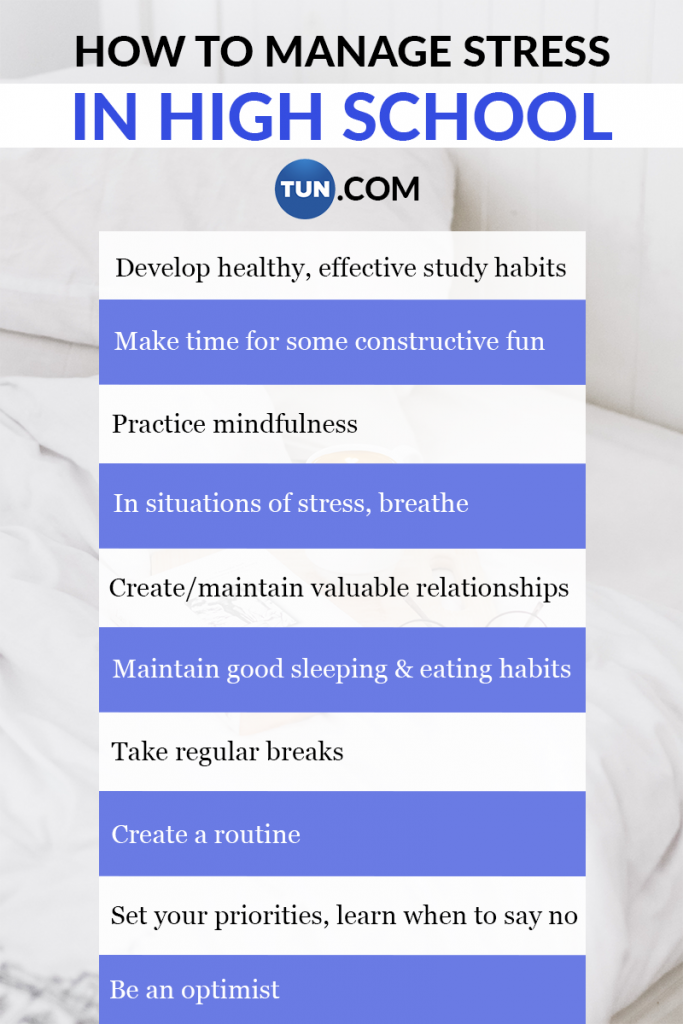If you’re a high school student experiencing feelings of stress, know that you aren’t alone. With the pressures of doing well in school, having a good social life, keeping up with extracurriculars, and making it to a good college or university, feeling stressed in high school is inevitable.
But, if left unmanaged, stress can become chronic and lead to many adverse mental and physical health effects, including anxiety, depression, headaches, fatigue, chest aches, and more, according to the Mayo Health Clinic.
For that reason, it is important to regularly check in with yourself and develop healthy habits so that you can effectively manage and minimize your stress levels.
Here are 10 steps you can take to manage stress in high school.

Develop healthy, effective study habits
The honest truth is, your grades in high school do matter, particularly if you have plans to go to college. For that reason, one of the easiest and most common ways to get stressed out is by falling behind on your studies.
But instead of cramming at the last minute, overworking yourself, or sprinting through your studies, which all cause unnecessary stress, slow down and take a calculated approach.
Give yourself ample time, pace yourself, and take regular breaks. If you do that, studying and completing assignments will become much more manageable and enjoyable. Ultimately, you should do what feels comfortable. However, if you’re someone who needs structure, there are specific study methods that you can follow.
Those who feel particularly anxious or weighed down by the thought of studying may benefit from using the Pomodoro study method. The method uses a timer to break down studying into intervals of 25 minutes with short breaks in between. During the breaks you can get on your phone, take a walk around the block, or make a quick bite to eat.
And for many, including Instagram study influencer @intellectys, the key to minimizing the stress attached to studying comes through staying organized.
“Breaking all my work down into more manageable chunks that I can plan on a calendar, add to my to-do list, and then cross off makes it so much easier to tackle a task, like writing a major essay or studying for an exam, that looks daunting at first glance,” she told TUN.
Make time for constructive fun
Fun is one of the ultimate stress relievers, according to the American Psychological Association (APA).
Find some constructive outlets to take your mind off of school. You could join a club at your high school, volunteer, practice music or art, go to the gym, or pick up a part-time job that brings you joy and puts a little bit of spending money in your pocket. Whatever is your idea of fun, don’t be afraid to pursue it.
But, remember not to overload yourself. There’s value in staying busy. But when things begin to pile up, it’s easy to start feeling overwhelmed.
Practice mindfulness
In its simplest form, being mindful is the ability to live in and experience the moment. Mindfulness is most often accomplished through meditation and is a proven way to reduce stress.
According to the APA, mindfulness meditation has two main parts, attention and acceptance.
“The attention piece is about tuning into your experiences to focus on what’s happening in the present moment,” an APA blog post reads. “It typically involves directing your awareness to your breath, your thoughts, the physical sensations in your body and the feelings you are experiencing. The acceptance piece involves observing those feelings and sensations without judgment. Instead of responding or reacting to those thoughts or feelings, you aim to note them and let them go.”
In situations of heightened stress, breathe
When dealing with moments of heightened stress, such as failing a test or missing an assignment, you may feel entirely overwhelmed. The best thing to do in these situations is to breathe. It will help you zoom out and consider the bigger picture.
“Ultimately, when we are feeling stressed, anxious, or any type of more intense emotion, we tend to breathe shallow,” Danielle Merolla, a clinical psychologist and the associate director of the Center for Prevention and Outreach at Stony Brook University, told TUN. “When we breathe shallowly, it immediately impacts our nervous system that then tells our brain we don’t have enough oxygen, that there is a lot to fear and there’s a lot to be concerned about. Then, all of a sudden, our body and mind become engaged in this kind of over-active process.”
“So, during those times, before walking into a test or an event, taking three deep diaphragmatic breaths — breathing literally from the belly up — then tells your brain, ‘Oh, I have enough oxygen. It’s okay,’” she added.
Once you’ve got your breathing down, convince yourself that your bad grade or slip-up is truly not the end of the world. Most goals have multiple paths, and a couple of speed bumps won’t throw you off the road.
Create and maintain valuable relationships
Throughout life, it helps to have a security net of people who you can fall back on in times of need.
According to the APA, one of the primary ways that young adults can build resilience is by creating “meaningful opportunities for connections with family, culture, and community.”
Make and bolster these connections by being active and present in your family, amongst your friends, and in your community. Go home and eat dinner with your family when you can. Join extracurricular activities and athletics teams that allow you to work closely with your peers. Volunteer in your community, and support local businesses and organizations when you have the opportunity to.
And when you’re in need of help, don’t hesitate to reach out to these people. It’s easy to feel that you’re alone in your feelings and that no one will be able to understand what you’re going through. But it is important to recognize that stress is not a unique phenomenon. And just talking about your stressors can do wonders.
Maintain good sleeping and eating habits
You may not believe it at first, but healthy sleeping and eating habits can greatly improve your ability to manage stress and your mental health in general.
• Healthy sleeping habits
According to the National Sleep Foundation, the average teenager between the age of 14 and 17 should get 8-10 hours of sleep each night. In reality, teens sleep an average of about 7 hours per night.
Additionally, the timing of that sleep matters. To develop a healthy sleeping pattern, you need to go to bed and wake up at roughly the same time every day, even on weekends.
“You can’t make up for sleep,” Jill Kubala, a registered dietician and wellness expert, told TUN. “If you’re sleeping five hours five days a week, you can’t make it up by sleeping 10 hours on Saturday and Sunday.”
If getting to bed on time is a challenge, try cutting down on caffeine, avoiding blue light, developing a nighttime routine, keeping the room temperature between 60 and 67 degrees Fahrenheit, or practicing any of the other tips outlined here.
• Healthy eating habits
What you eat directly impacts your physical and mental health. While certain foods, like sugary foods, fast food, and over-processed foods, lead to cognitive decline, others are known to help control your stress, anxiety, depression and mood.
Some of the best foods for mental health include turkey breast, nuts, seeds, avocados, dark chocolate, blueberries, yogurt, leafy greens, oatmeal, herbal teas, and eggs.
Take regular breaks
Breaks are extremely important for preventing and mitigating stress. Not only can taking short breaks throughout the day help you calm down in moments of heightened stress, but they also can help keep you from getting stressed out in the future.
“Much like regular exercise and sleep, work breaks function both as prevention and intervention,” Charlotte Fritz, an associate professor in industrial/organizational psychology at Portland State University in Oregon, told APA. “Taking regular breaks helps us to be more resilient when stressors arise, and they function as an intervention to help us deal with the daily grind.”
Create a routine
According to Northwestern Medicine, routines can lead to better stress levels, better sleep, and better physical health as well.
So what does a healthy routine look like? Ultimately, it means completing daily tasks around the same time each day. Find what feels right for you. Wake up at roughly the same time. Have a specific time when you sit down to do your homework and/or study. Try to fall asleep, or at least be in bed, around the same time each night.
Of course, you’re allowed to break your routine every now and then. But, if you break it too often, it no longer is a routine.
Set your priorities and learn when to say no
As a high school student with tons of aspirations, it can be easy to overload yourself with difficult classes and extracurriculars. But you can’t do it all.
Of course, saying no can be a difficult task. And deciding when to say no is even harder. No matter how old you are, when making these decisions, the Mayo Health Clinic suggests focusing on what matters most, weighing the “yes-to-stress ratio,” taking guilt out of the equation, and sleeping on it.
“Saying no won’t be easy if you’re used to saying yes all the time,” the Mayo Clinic’s blog post states. “But learning to say no is an important part of simplifying your life and managing your stress. And with practice, you may find saying no gets easier.”
You need to prioritize your personal happiness and wellbeing. And if that means setting something on the back burner for a little while, that is okay!
Be an optimist
Positive thinking can do wonders for lowering your stress levels and preserving your overall mental and physical health.
“Positive thinking doesn’t mean that you keep your head in the sand and ignore life’s less pleasant situations,” states a Mayo Health Clinic blog post. “Positive thinking just means that you approach unpleasantness in a more positive and productive way. You think the best is going to happen, not the worst.”
Try to flex your thoughts into being positive instead of negative. Practice gratitude. Be grateful for what you have and hungry to accomplish more.
Conclusion
As a high school student, you have a lot of responsibilities. And stress is perfectly natural. In small doses, it can even be motivational. But, if left unchecked, stress can become entirely overwhelming and unmanageable. For that reason, it is necessary to learn how to identify and mitigate stress early on in your life.



